Sudden! Exclusive! Direct attack on Guinea’s military coup, global events will see the main station again.
At 8 o’clock local time on September 5, the gunfire in Conakry, the capital of Guinea, was loud and lasted for about one hour. The army blocked the road, and residents were forbidden to go out. In a blink of an eye, the situation suddenly changed!
When the storm started, the centers of the main station quickly took action, and the platforms were urgently linked to report directly on Guinea!
Speed! CGTN English new media reports are ahead of many western media, and it takes only one and a half hours for TV to get the news from monitoring and open the live TV connection with simultaneous interpretation. After the international department of the news center and the Africa main station verified the accuracy, Oriental Time and Space premiered the scrolling news at 20:07.
Heavy! On the evening of 5th, local time, CGTN French reporter interviewed Mamadi Doumbouya, the leader of the coup, exclusively with high-level representatives of various Guinean forces within 8 hours after the incident, and conveyed the voices of all parties objectively and truly.
Live! The news center made overall coordination, and the International Exchange Bureau made a good guarantee. The reporters, reporters and correspondents in front of the main desk broke through the numerous barriers under the situation and epidemic situation, and worked all night on their way to the next news scene. The reporter from Africa Station became the only China reporter to enter Conakry.
Spanning the time difference of more than 10,000 kilometers and eight hours, the front desk is laid out and buried thousands of miles in advance. With its increasingly solid overseas reporting power and the ever-changing international reporting adaptability, the front desk voice and China voice are everywhere and all the time.
Today, listen and observe the appearance of Jun Biao, the situation in West Africa is rising, and the main event is at the reception desk!
Time limit for reporting, as fast as lightning
At 18:03 Beijing time on September 5th.
Within two hours after the gunshots came out, CGTN English New Media at the main station released the news that "there was a fierce gunshot in the Guinean capital", ahead of many western media such as Reuters, Bloomberg and BBC.
twenty past eight p.m.
The French Department of CGTN contacted Niya Wulei, a reporter from C? te d ‘Ivoire, a correspondent from Guinea and a local Chinese-funded enterprise to verify the news at the first time.
half past nine p.m.
The CGTN English TV terminal supervisor saw the news that the Guinean president was under control, and the emergency mechanism was quickly launched. The French "coup d’ é tat in Guinea" special report group was established, and the first audio and video interview from Guinea was sent back to Beijing at 21:40.
eleven o’clock pm
After CGTN recommended to contact guests in French, simultaneous interpretation and other resources were prepared, CGTN English TV successfully opened the live connection to cooperate with the studio simultaneous interpretation. At this time, it is only one and a half hours before receiving the monitoring message.
On the evening of September 5th, Beijing time, the special team of CGTN French-speaking Beijing Headquarters, together with the production studio in Dakar, West Africa and the reporters from C? te d ‘Ivoire, spent a sleepless night.
Remote control command of Beijing headquarters, responsible for topic selection planning, manuscript revision, video examination and approval, and arrangement of broadcasting. The texts, videos, pictures, telephone interviews, etc. sent back by the team in front of West Africa are processed by the team on duty in Beijing, and quickly delivered to the language platforms of the main station.
In terms of programming, CGTN French made urgent adjustments: heavy interviews, live reports, live connection … … Various forms go hand in hand. Starting from September 6th, CGTN French Department opened a "direct attack on Guinea" section at 20: 00 every night, connecting the reporting team in front to broadcast the latest news.
The CGTN Europe, Africa and North America Regional System Center relayed live reports, and at 0: 00 on the 6 th, it got the picture of President Conte being controlled and the speech of armed rebels.
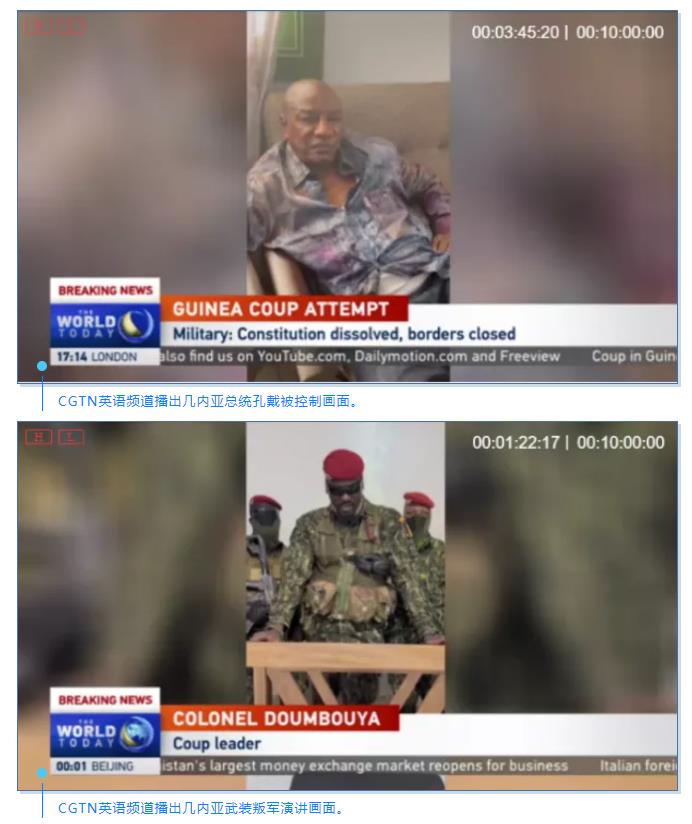
Looking back on the whole day of September 5th, the most important report was an exclusive interview with Mamadi Doumbouya, the leader of the coup d’ é tat and Lieutenant Colonel of the Guinean Special Forces — —
An exclusive interview is more powerful than a thousand times.
On the evening of 5th local time, Niya Wulei, a reporter from C? te d ‘Ivoire at the reception desk, mobilized her reporting resources in Guinea, and returned an exclusive interview with Mamadi Doumbouya, the initiator of the coup, within eight hours of the coup.
During the interview, Doumbouya introduced the reasons for the coup and the current situation of President Conte.

On the first day of deployment, the exclusive interview with the reception desk was gradually launched, with authoritative reports, hit the floor. Su Yi, a reporter from CGTN English Radio, made an exclusive interview with Moussa, the economic adviser to the Guinean President, on the domestic situation in Guinea, the formation of the new government and the cooperation between Guinea and China.
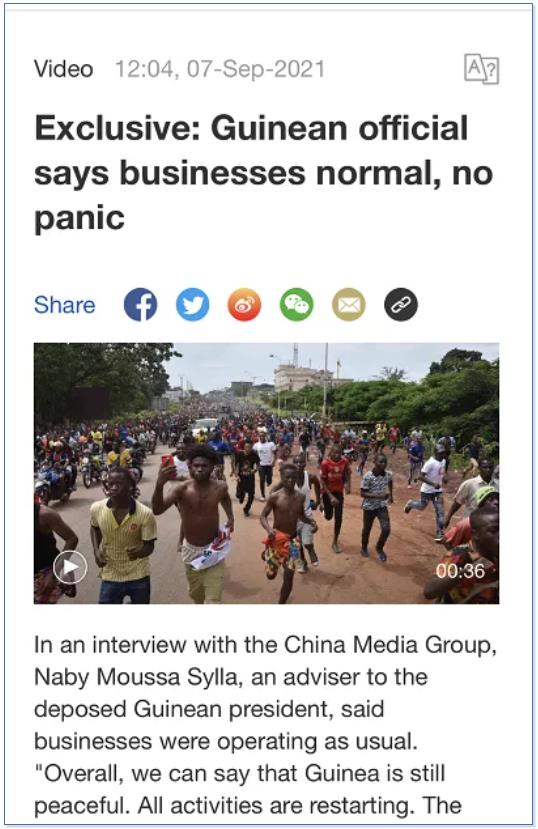
On the 8th, local time, CGTN reporter Niya Wulei made an exclusive interview with Cellou Dalein Diallo, the leader of Guinea’s main opposition and chairman of the Democratic Forces Alliance of Guinea, and Sekou Nana Sheila, deputy secretary general of the People’s Alliance of Guinea.
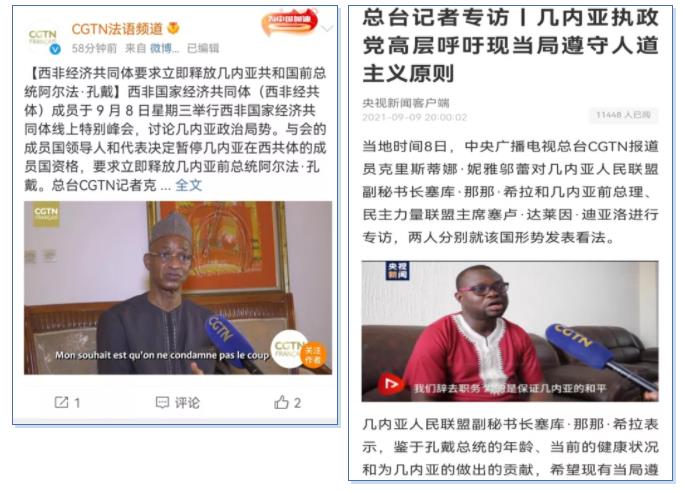
On the 10th, local time, Niya Wulei, a reporter from the General Station, interviewed Jean-Claude Blue, Chairman of the Commission of the Economic Community of West African States.

After nearly a year in exile in C? te d ‘Ivoire, Sidia Toure, former Guinean Prime Minister and President of the Union of Republican Forces, returned to Conakry on the 10th local time to participate in the national consultation announced by the coup military. Niya Wu Lei, the reporter of the reception desk, told Sidia? Toure had an exclusive interview.
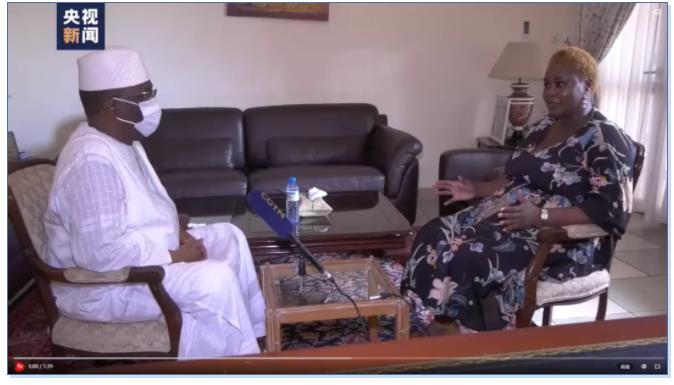
On the 13th, local time, Niya Wulei, reporter of the General Station, interviewed Mohamed Saleh Annadif, Special Representative of the UN Secretary-General for West Africa and Sahel.

Truth is the life of the media. Reliable news and authoritative information embody the responsibility and quality of the media.
The series of exclusive interviews with the reception desk had a positive dialogue with all forces in Guinea, which objectively, fairly and impartially reflected the demands of all parties and the common expectation of unity and peace.
In the international public opinion field, China’s voice is truly authoritative and powerful.
In these exclusive interviews, we can always see the name of Niya Wu Lei, the reporter of the main station. Her story, the stories of reporters, reporters and correspondents at the reception desk, let’s continue to read — —
Go to the scene, with great ambition.
"Trust, give the opportunity of exclusive interview to the front desk."
On the 6th local time, the leader of the coup in Guinea announced that the land and air borders had been reopened. We can go to Guinea! Niya Wulei, a reporter from C? te d ‘Ivoire at the reception desk, was instructed to break through the numerous barriers in the situation and epidemic situation at the first time and fly to Conakry with CGTN microphone.

Niya Wu Lei is a reporter for the reception desk, half Guinean and the mother of a three-year-old child. Despite her attachment, it may be one of the most important news events in 2021 to be able to return to her birthplace and follow up on West Africa. She feels proud and full of energy.
When she came to Guinea, she met her partner who fought side by side. Baldet, a senior local media person in Guinea, has been found as a correspondent in the production room of Dakar, and is ready to meet him in Conakry.
One live connection, one exclusive interview and one graphic report every day.
Rest at 2 am, have a meeting with the special team of Beijing headquarters at 8 am on time, and set off immediately after arranging the work content of the day. This is the daily work rhythm of Niya Wulei and Baldet in front of Guinea.
Since the 6th, they have sent back six exclusive interviews.
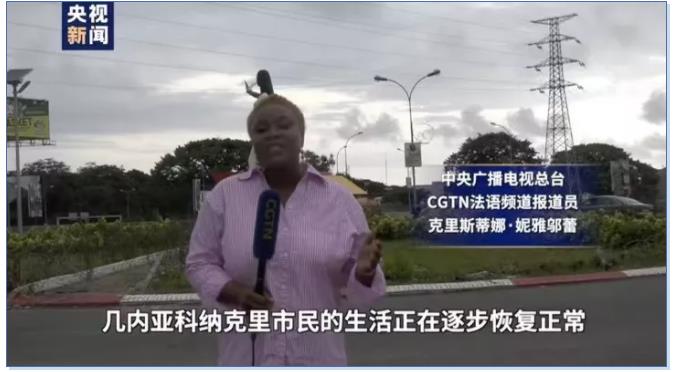
Baldet gave Niya Wulei great support by using local network resources. China’s objective and fair position in international reporting and CGTN’s slogan "see the difference" also made local politicians and people feel good. High-level officials from all parties in Guinea are willing to give priority to interviews with CGTN.
When former Guinean Prime Minister Sidia Toure returned to Conakry on 10th, CGTN French Department got the news and got in touch with him. Toure rejected the invitation of all other media (including France International Television 5) and gave an exclusive interview to CGTN.
The most unforgettable interview scene is the meeting between the ECOWAS delegation and the coup military. Jean-Claude, Chairman of the ECOWAS Commission? Blue originally refused all media interviews, and after constant coordination by Baldet, the correspondent of the reception desk, Blue finally agreed to get off the bus and make a 40-second concluding speech. Dozens of media and nearly a hundred media people swarmed on the scene, and the reporter of the general station finally took the interview picture.
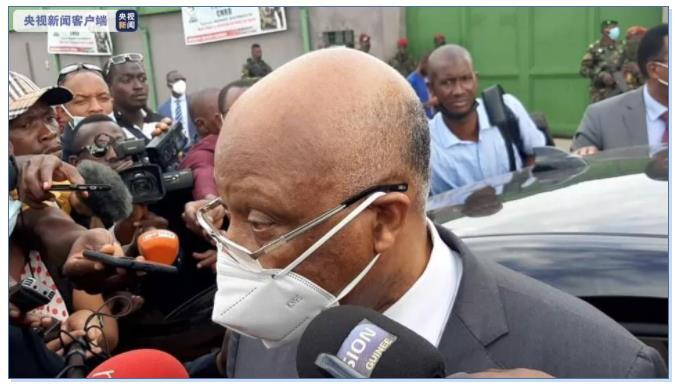
Now, Niya Wu Lei and Baldet are still on their way to one news scene after another. There are more reporters, reporters and correspondents at the main station, and they are active in the same land.
The CGTN Africa Regional System Center sent Senegalese journalist Desri Konon for an emergency nucleic acid test in advance, and rushed to Guinea on the first day after the flight resumed, and immediately sent it back to the mirror the next day. Continue to hit the scene of major events in Guinea and interview politicians, people and scholars from all sides. Where the news happened, there must be a reporter from the reception desk!
“
Be sure to be accurate
Be sure to be timely.
Be sure to be safe
"
After the September 5 incident, Guinea’s land and air borders were closed and all flights were cancelled.
The director of the General Desk immediately asked the editorial office, CGTN, Africa Station, Asia-Africa Center, news center, news and new media center, international exchange bureau and other departments to quickly start hot planning, maintain the advantages shown in the Afghanistan report, and grasp the exclusive starting point and depth.
The main station in Africa immediately launched an emergency response mechanism for major emergencies, breaking the normal division of labor among journalists’ stations, deeply linking with domestic departments, and reaching the scene in Guinea in all possible ways.
Accurate verification and timely broadcast. The gunshots in Conakry just sounded, and the international department of the news center monitored the relevant information, and accurately verified the real situation ahead with the African main station at the first time.
At 20:07, the news of "Oriental Time and Space" was first broadcast. Subsequently, the Evening News broadcast a video report. "24 Hours" and "Midnight News" have been connected live with Qu Sheng, a reporter from Johannesburg Station in South Africa under the jurisdiction of Africa General Station.
The first time, send back the manuscript. The situation has changed suddenly, and the safety of local China citizens has touched people’s hearts. The Africa Terminal communicated with the International Department of the News Center all night, and interviewed Yue Shaowen, spokesman of the China Embassy in Guinea, at the first time. The report sent back in front was quickly broadcast at 6 o’clock on the 6th of Chao Wen Tian Xia, which was the first interview audio of Guinea Embassy in Chinese media.
The Africa Terminal interviewed China citizens in Guinea remotely, and it was quickly broadcast in "Chao Wen Tian Xia" at 8 o’clock more than an hour after returning the report, which became the first video interview of citizens in China in Guinea by domestic media.
Before the personnel arrive, the security comes first. The International Exchange Bureau of the General Desk and the Africa General Station are not far from the mountains and seas, and jointly arrange necessary matters such as epidemic prevention, safety guarantee and emergency treatment for journalists who are going to cover Guinea, as well as personnel, equipment and facilities, so as to ensure the safety and smooth coverage of journalists.
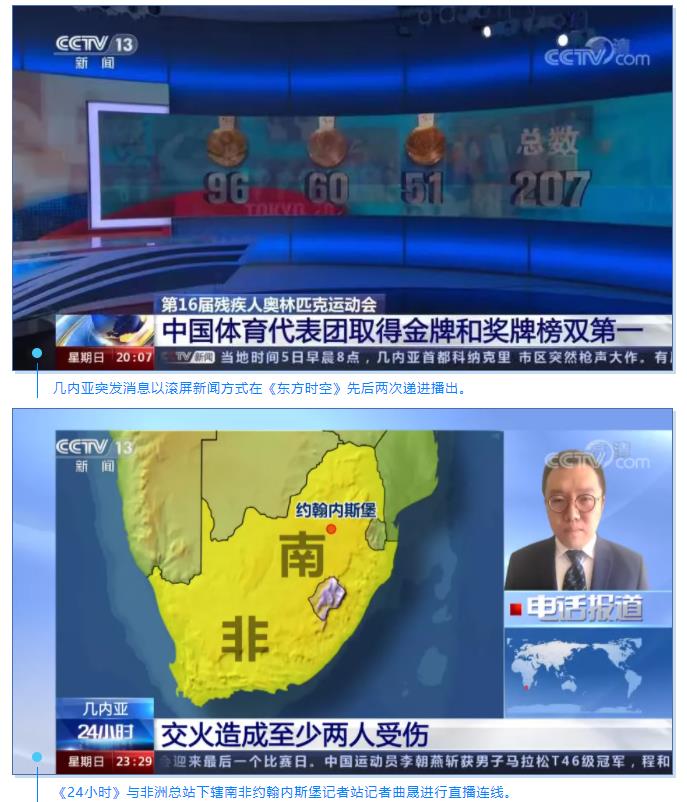
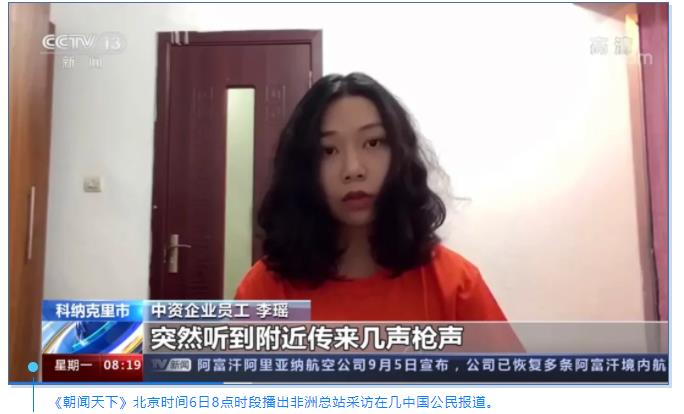
"The only China reporter to enter Conakry"
The Dakar reporter station, located in Senegal, Guinea’s neighboring country, has become one of the closest places to Guinea. During the period of border closure, Han Xu, a reporter from Dakar Station, reported the situation in Guinea by means of live connection, telephone interview and video vlog, while secretly saving his strength and waiting for an opportunity to jump into the news scene.
The good news has finally arrived! Guinea reopened its border, and when Guinea resumed its air route with Senegal, the Africa General Station sent Han Xu to Conakry. He used vlog to record the whole journey from Dakar, where the sun was shining, to Conakry, where lightning flashed and thunder thundered.
Upon his arrival, he became the first and only China journalist to cover the Guinean coup in Conakry.

On the 10th local time, the ECOWAS delegation arrived in Conakry to discuss with the military representatives of the coup. Due to the unstable situation and chaotic information, the entire Guinean journalist circle did not know which hotel the delegation and the military were holding talks at.
Han Xu, his Senegalese cameraman and local correspondent, dare not rest at all, and make a non-stop transition to confirm every possible location. Finally, they succeeded in taking an important shot of coup leader Doumbouya from the best angle of the conference hotel.
When the ECOWAS delegation left the military camp after visiting Conte, the scene was a mess. The detachment of the General Desk broke through the encirclement and seized the position of the window with the best shooting angle, and got an exclusive interview with Botchwey, an important member of the ECOWAS delegation and Ghana’s Minister of Foreign Affairs and Regional Integration.
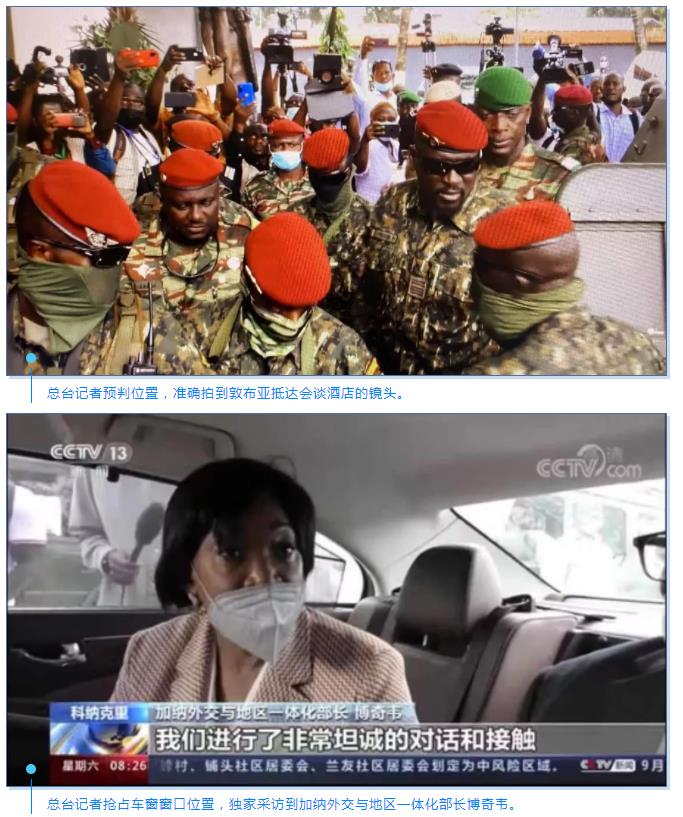
Under the double shadow of the coup and the epidemic, Conakry, the capital of Guinea, implemented a very strict media control policy, and shooting in the street, whether using cameras or mobile phones, would be blocked by military police and ordinary people.
Guinea is the first sub-Saharan African country to establish diplomatic relations with New China. In recent years, China-Guinea comprehensive strategic partnership has developed rapidly. There are many Chinese-funded enterprises and overseas Chinese in Guinea. As the only "face of china" who reported the coup in Guinea this time, Han Xu made full use of local resources, specially arranged for local Chinese businessmen in Guinea to accompany him, and invited a local police colleague to revisit the place where the coup took place and where the parties exchanged fire, and to visit the lives of local people.
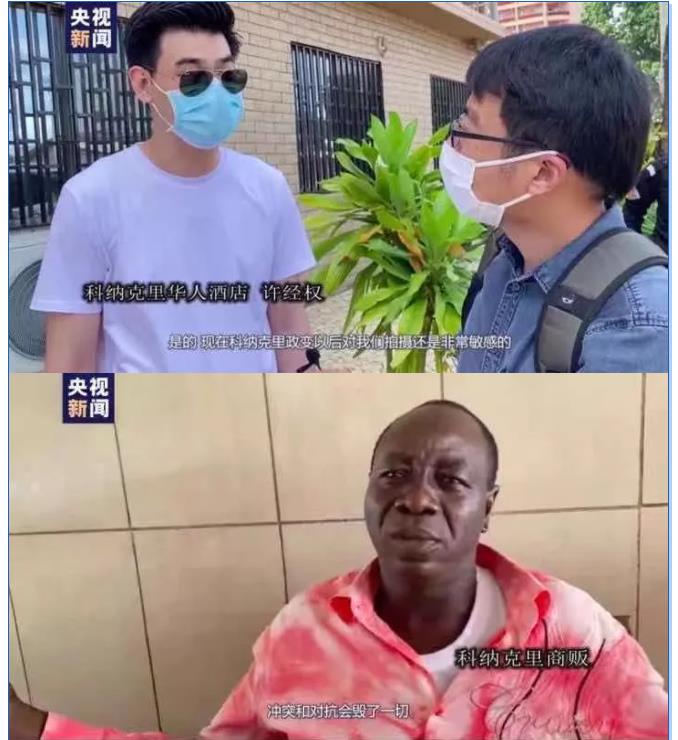

The reporter from the reception desk interviewed Guinean and China vendors in Conakry’s largest market.
Although the shooting process is inevitably hindered, the smoothness and safety of the report are guaranteed to the greatest extent. Everyone said that the situation in Guinea has calmed down and most shops have reopened.
After the video shot by the reporter was released, many local overseas Chinese said that the Chinese report sent by the reception desk from Guinea had reassured their relatives far away in the motherland.
International news reports are like a rally. Only when drivers and navigators keep step with each other can they win.
The reporting power of the reception desk in Guinea, even in the whole West Africa region and around the world has jumped to the forefront; The rear team controls the rhythm, strategizes and provides strong command and support.
From the beginning of the military coup in Guinea on September 5 to September 15, the exclusive reports sent back by reporters in front of the main station in ten days have been adopted by 54 video channels in 39 countries and regions, including British Sky News, France 24, France-Germany Public Television, Italy TGCOM24, South African Broadcasting Corporation, Brazil Flag Bearer Television, Mexico Millennium Television and Angola National Television, as well as 10 new media platforms, including European News Exchange Union and Australian Broadcasting Corporation YouTube account.
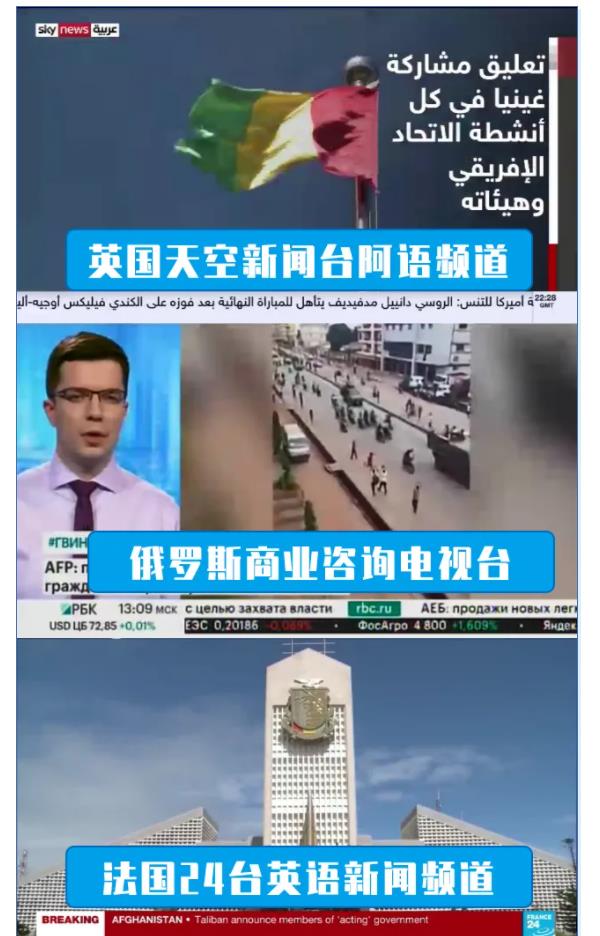
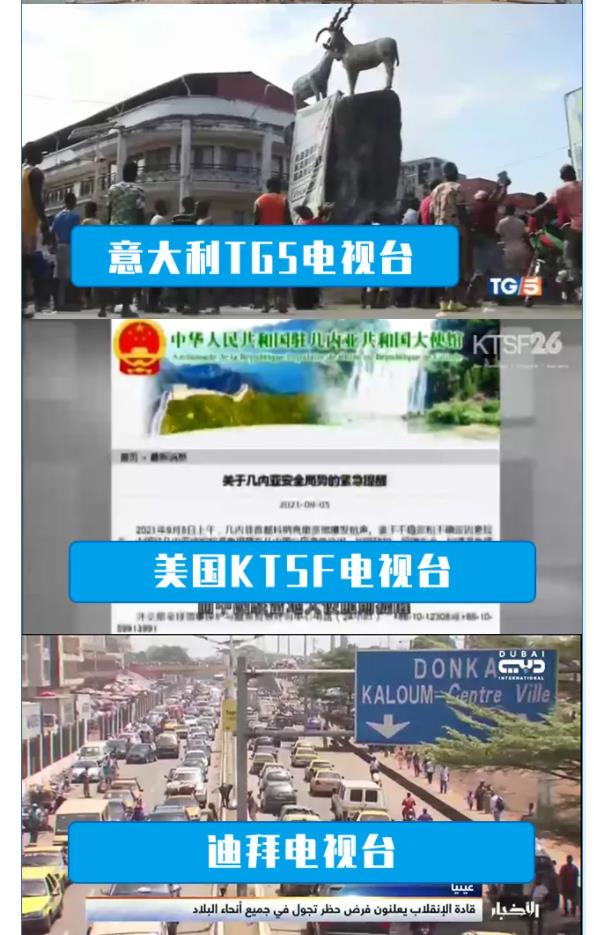

West Africa is in a storm, and the main event is at the reception desk!
China poet Du Fu imagined in his poems.
"Andrew’s strong men are holding the Tianhe River, and it is not necessary to wash the armor for a long time."
Look forward to stopping the war and fighting.
Guinea folk song "Elephant"
Also sing the people’s yearning for peace
"The sun just rises, and the earth glows red.
The earth becomes young and beautiful.
The elephant walked safely through the forest.
Now the darkness will dissipate. "
… …
A true record, an objective report
Front desk lens
Can’t dye the dust full of prejudice.
Sunshine of peace and care
Then come in